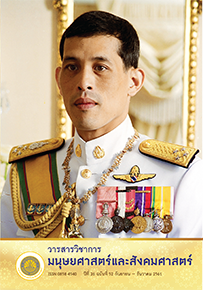The Cultivation of Change Agents amongst the Youth in Aeko-Saenkumlue Village, Using the Contemplation-oriented Transformative Facilitation
Main Article Content
Abstract
This research objective was to investigate educational transform in the internal potential and the external potential of new generation leaders of Aeko-Saenkumlue community themselves, by using the contemplation-oriented transformative facilitation. This research is a non-experimental research, and it focused on organizing the contemplation-oriented transformative facilitation for a group of villagers who had volunteered, and were particularly chosen to participate in the research. The research results found out that the new generation leaders started developing changes within themselves in the sphere of being able to communicate and express their feeling truly and genuinely, being courageous to express themselves in public, having self-awareness, beginning to be able to see the importance of expression in terms of being empathy towards others, including having an inspiration to become good leaders. In addition, relationship bond was positively developed with the closely surrounding people. In terms of the outwardly achievement, though the leaders could develop skills in presentation, listing the household accounting and being able to draft the project well, researcher had not yet found their mutual perception that could be connected with the group’s strength in driving the overall projects systematically. Researchers found that this new generation leader group should learn and develop to build up their internal potential through aesthetics communication skill training and the practice of cultivating the mind, as well as learning to revitalize original wisdom and practice their skills in a process method.
Downloads
Article Details
บทความทุกบทความเป็นลิขสิทธิ์ของวารสารวิชาการมนุษยศาสตร์และสังคมศาสตร์ มหาวิทยาลัยบูรพาเท่านั้น
References
บุญธรรม กิจปรีดาบริสุทธิ์. (2549). ระเบียบวิธีการวิจัยทางสังคมศาสตร์ (พิมพ์ครั้งที่ 9). กรุงเทพฯ: จามจุรีโปรดักท์.
รัตติกรณ์ จงวิศาล. (2556). ภาวะผู้นำ: ทฤษฎี การวิจัย และแนวทางสู่การพัฒนา (พิมพ์ครั้งที่ 2). กรุงเทพฯ: จุฬาลงกรณ์มหาวิทยาลัย.
สมสิทธิ์ อัสดรนิธี, และกาญจนา ภูครองนาค. (2555). การศึกษาวิเคราะห์ความรู้เกี่ยวกับการเรียนรู้สู่การเปลี่ยนแปลงตามแนวจิตต
ปัญญาศึกษาเพื่อการบ่มเพาะความซื่อตรง. นครปฐม: คณะกรรมาธิการการศาสนา คุณธรรม จริยธรรม ศิลปะ และวัฒนธรรม
วุฒิสภา และศูนย์จิตตปัญญาศึกษา มหาวิทยาลัยมหิดล. (เอกสารไม่ตีพิมพ์).
สมสิทธิ์ อัสดรนิธี และคณะ. (2556). กระบวนการเรียนรู้สู่การเปลี่ยนแปลงแนวจิตตปัญญาศึกษาเพื่อนำไปสู่ความสามัคคีกลมเกลียว
ของส่วนรวม: กรณีศึกษาหมู่บ้านแอโก๋–แสนคำลือ อำเภอปางมะผ้า จังหวัดแม่ฮ่องสอน. นครปฐม: คณะกรรมาธิการการศาสนา คุณธรรม จริยธรรม ศิลปะ และวัฒนธรรม วุฒิสภา มหาวิทยาลัยมหิดล. (เอกสารไม่ตีพิมพ์).
Kitchenham, A. (2008). The Evolution of John Mezirow’s Transformative Learning Theory. Journal of transformative
education, 6(2), 104 – 123.
Reimer, J., Paolitto, D.P., & Hersh, R.H. (1990). Promoting Moral Growth : From Piaget to Kohlberg. (2nd Ed.). Long Grove: Waveland Press.


